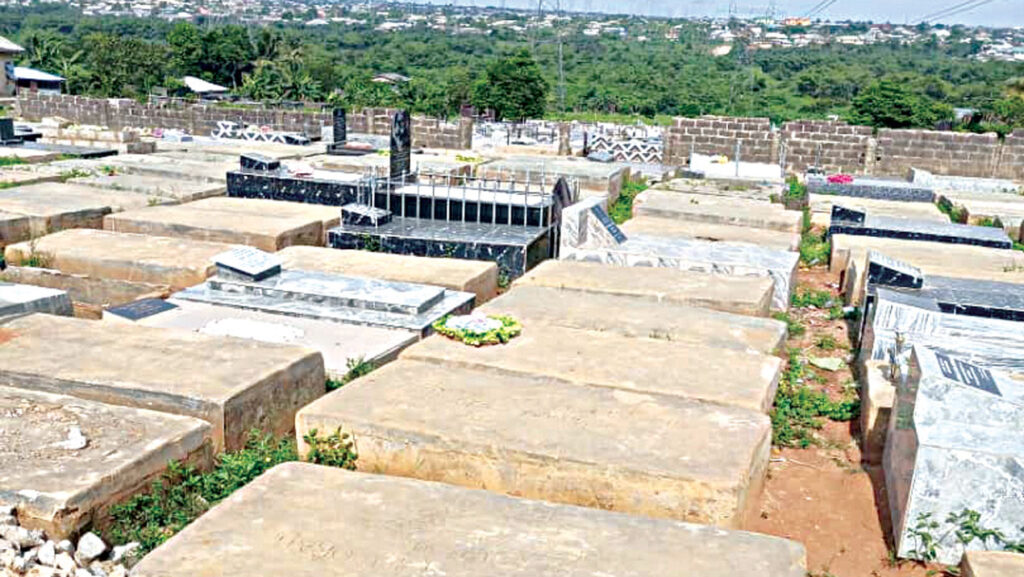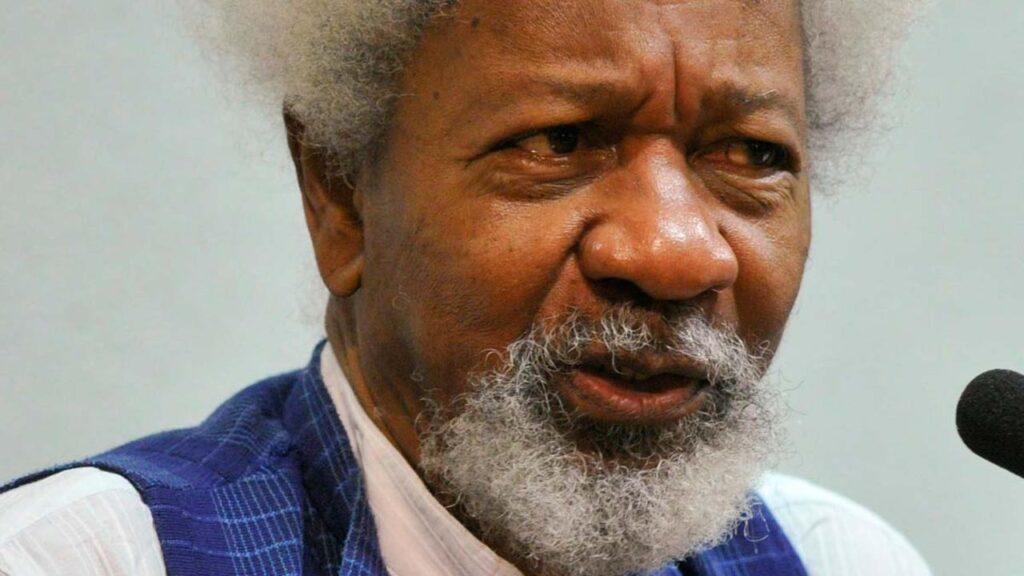
Heading to Atan Cemetery from Ayobo-Ipaja Road, Lagos, a gigantic high-tension pole greets you as you make your way into the community. Unlike locations where the cemetery is usually in isolated parts, in Ona Aran community, the case is different.
While the traders and artisan go about their business, mourners troop in and out of the cemetery, usually dressed in black, to bury loved ones. From all indication, residents are now used to living with the dead.
About two months ago, the Lagos State Government revealed plans to put a ban on burial in residential areas, hence the increasing need for burial grounds. While Lagosians await implementation of the law, there are signs that finding resting place for the dead may become a huge task in years to come.
Initially, the Atan Cemetery was restricted to a particular area and fenced. But as more bodies were laid to rest, taking up the spaces, the fence was broken down and the cemetery expanded to take more of the residential and business areas.
According to the Manager, Jonathan Iwusun, “this is big enough to accommodate whatsoever number of bodies that needs to be buried. Right here we are standing used to be a fishpond; there was also a church here as well. We will keep going forward as bodies come. Before this whole space is taken over, definitely another space will be created; even other Local Councils like Agbado Okodo are now creating new areas.”
Iwusun informed that it costs N100, 000 to secure a spot for burial, which is built with blocks and cemented appropriately from six feet into the ground. This prevents cases of reburying in the same spot as applicable in some cemeteries. In this case, the space is owned for life.
However, as burial spots began to encroach into the community, there are plans for more expansion, as residents and artisans who are affected have been served notice to further create burial spots.
Meanwhile, a key feature to note is that the burial site is located close to the powerline, which is clearly unsafe for habitation.
Akeem, one of the workers at the cemetery, said, “This is a powerline region and ideally it is not habitable. We are aware that the ‘PHCN’ has settled some of the landowners in this area, but their greed made them resell the lands thereby causing problems. If you go the local council, you will find plenty of files addressing this issue and I am sure it has amounted to nothing. All the houses and shops in the area will eventually leave, as bodies for burial keep coming; they are truly aware of that.”
When asked about incidents of encountering ‘spirits of the dead,’ Iwusun explained, “by the grace of God, I have been working here for eight years; I have never witnessed any incident of the dead or spirit coming after me or anyone. Are you a Christian? The Bible says that after death comes judgment and that brings the end of man. We will all join them one day; there is no business between the dead and the living. They are gone.”
He continued: “This is the site the government has allocated and we have constantly seen land owners in the area write to the government, even at the federal level, concerning its expansion and it has amounted to nothing.”
Beside the expanded cemetery is a bungalow in form of a public compound; only a fence separates it from the cemetery. A middle-aged woman identified as Ajike, when asked about being comfortable living close to a cemetery, “The dead are people like us before they died; they don’t scare anyone. We all come out to sit out especially when there is no light, so we get fresh air. I have lived here for eight years and I will continue staying here if we are not asked to leave due to expansion.”
Ajike, however, narrated incidents that have occurred with the dead, which she doesn’t consider a threat to living in the community.
“Sometimes, the spirits of the dead come out, especially when the graves have not reached the road as it is now. They would usually come out in the afternoon and when real people meet with them, the person’s head would swell, which gives you the feeling that you have come in contact with a spirit. They (spirit) usually don’t disturb people; they go on their own, while humans go their way too. But when a human tries to cross his/her boundary, he/she will see the wrath of the spirit.”
In another incident, she said, “a man parked here sometime last year and a young lady alighted from the vehicle; he asked to take the lady home and she said she was home already. Immediately, the man knew he had carried a spirit, as she walked down towards the cemetery. The man probably picked her up in town, having seen a fine girl.”
Ajike also noted that a man popularly referred to as Coach had seen two ladies walking along the cemetery.
“He tried to woo them, but they ignored him. Instead of going his way, he went on to pull their clothes and realised they were spirit, as he gave a loud scream. By the time he got home, he met them inside his apartment; they told him he had invited them himself and so they are here now and they beat him up. He was taken to several churches; it took a church headed by one Baba Eli to heal him.
She continued: “Another man popularly known as Baba O usually would come home at late hour. That particular night, he saw three people fully dressed in white walking towards him; he threw everything he had with him and ran for his dear life. Afterwards, the man packed out of this neighbourhood.”
Ajike added that she is still not scared living here as the spirits of the dead let humans be, except you choose to trespass. “There is hardly any need for security here; things don’t get missing, because those spirits are like security for us here. As you can see, there are no main doors here, my doors are constantly opened; I have not heard of any incident of robbery or theft and that is one benefit staying here.”
Another resident popularly called Aare has lived in the neighbourhood for over 18 years. According to him, “When I got here, the grave yard was still down and far inside, so you will barely notice there is a cemetery around here. There was a wall before it was broken down and the burial spots kept coming up. However, in my years of living here, I have never seen or witnessed any disturbance from ghosts; I am one person who stays out late in front of my home for fresh air.
“In fact, a few days ago, a group of people came to bury their dead got here past 6:00pm and no one is allowed to bury after 6:00pm. So, they had to stay with the corpse till morning before burying and I was there with them.”
He continued: “A lot of houses around here started springing up when I started living here; I live here with my wife and 12-year old son. We come out at night to use the toilet, which is a little distance from my house; there has been no problem at all. Usually, from 4:00a.m, you find people leaving for work, and so far people are safe. We are aware that the cemetery will be coming forward and taking most of the land, but then I have not been served any notice yet,” he noted.
He added: “I am a herbalist and that is what I do for a living. However, it is quite risky as it is very easy for people to assume I will use body parts of corpses for ritual. I have been wrongly accused once and even picked up by the police. As much as I don’t have any issues living here, I cannot wait to complete my house so I can leave this place.”
According to another resident, Bola, who sells recharge cards by the cemetery, “a vision came out in a nearby church that people should stop stepping on the grave as the dead are not happy about it. I honestly don’t think it is right having to step on graves just because one has to pass by. People should show the dead that sign of respect and walk beside the graves if they have to pass by as I always see people do.”
Aare continued, “we stay in this vicinity to celebrate marriage ceremonies, freedom as artisans and even when people die from this neighbourhood, they are buried in this same cemetery, so this is our neighbourhood and we have no reason to be scared. Else, we would have all parked out of this neighborhood by now.”
On the challenges of getting burial space, he said, “if we all die, I doubt there will be space to bury; Agege, Abule Eleko are full. Most burial spots can no longer take more bodies; most of those buried in this cemetery were from Apapa, Surulere, Iju, even Ogun State.” He, however, said cremation might become a better option if burial spots begin to compete with residential areas.
“There is this method of burying people that involves burning them into ashes; this replaces burial spots with ashes in a can. I think we may begin to consider it if we run out of space like the Saudi Arabians and the Indians I have witnessed who practice this.”











